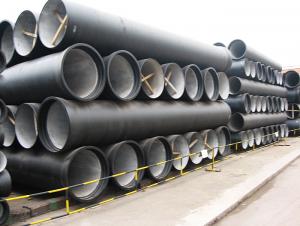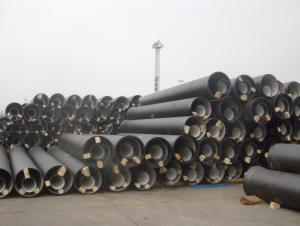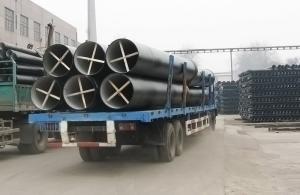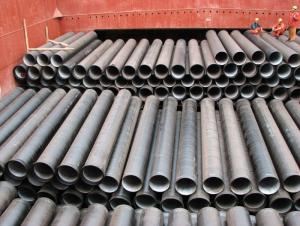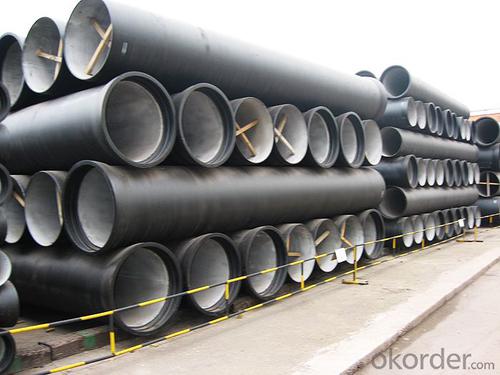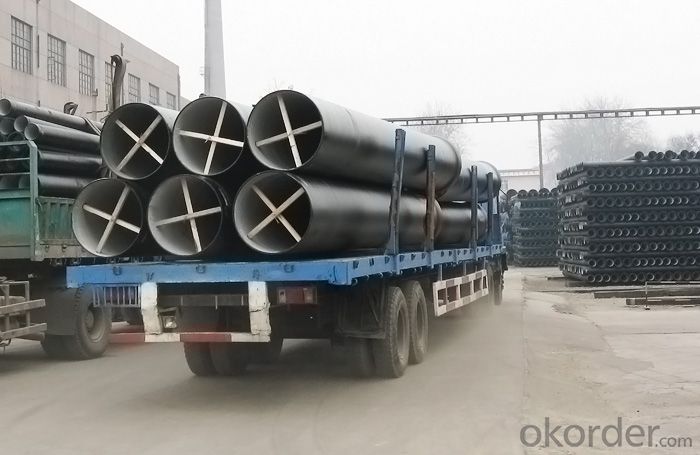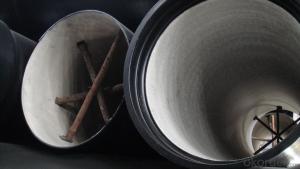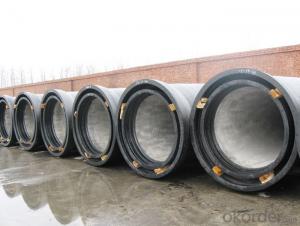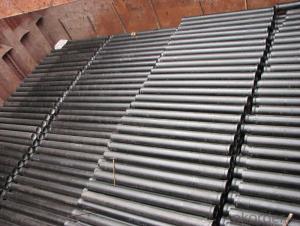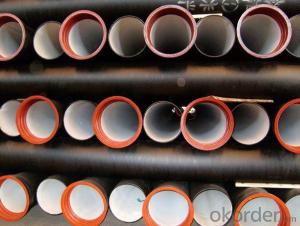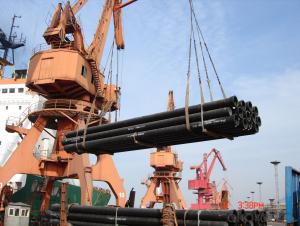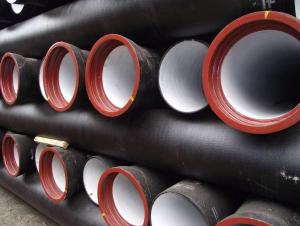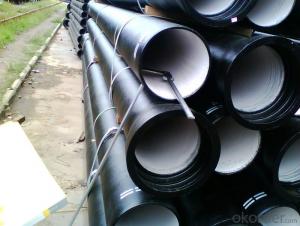ISO2531/En545/En598 Centrifugal Dcutile Iron Pipe
- Loading Port:
- Tianjin
- Payment Terms:
- TT or LC
- Min Order Qty:
- 1 m.t.
- Supply Capability:
- 500000 m.t./month
OKorder Service Pledge
OKorder Financial Service
You Might Also Like
Product Name | Ductile Iron Pipes |
Material | Ductile Cast Iron |
Registered Brand | CMAX or CNBM |
Nominal Diameter | DN80 - DN2000mm |
Application | Water supply, Drainage, Civil Engineering, Construction & Housing, etc. |
Standard | EN545, EN598, ISO2531 |
Joint Type | T type, Flange type, Self-restrained type |
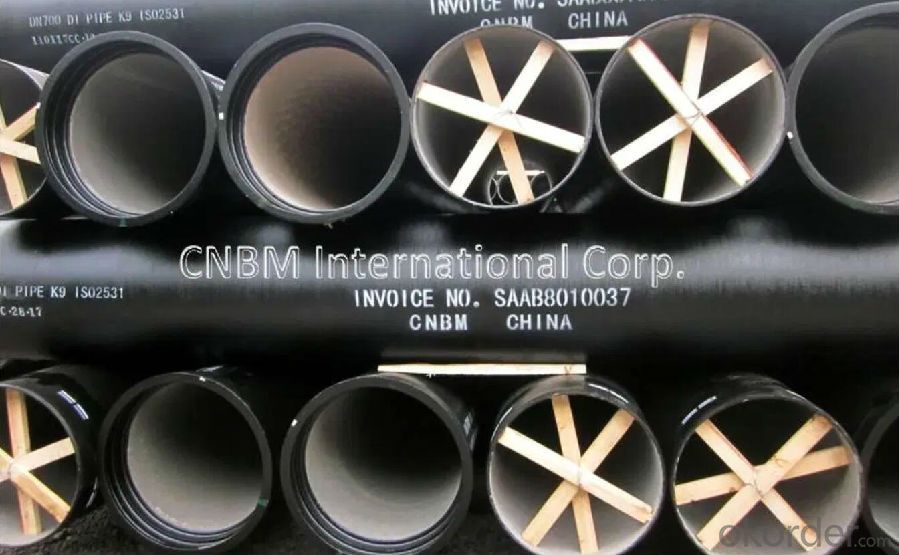
Packaging & Shipping
Container Loading
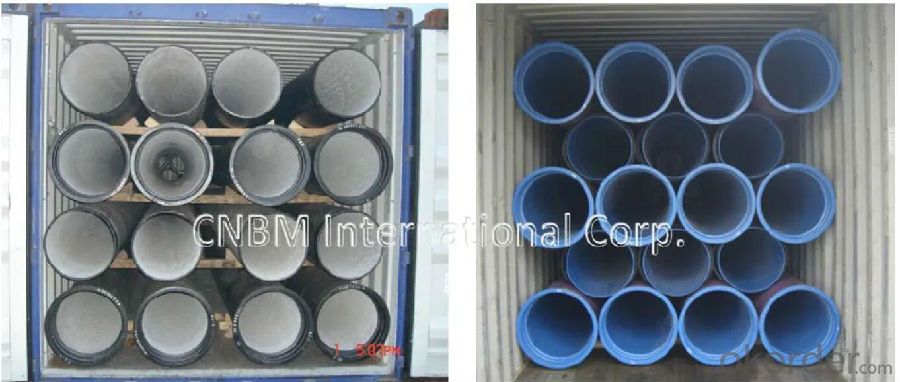
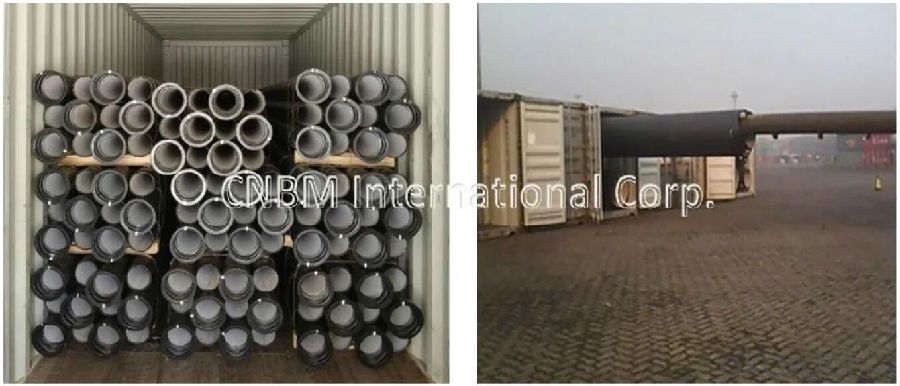 Bulk Bulk Loading
Bulk Bulk Loading
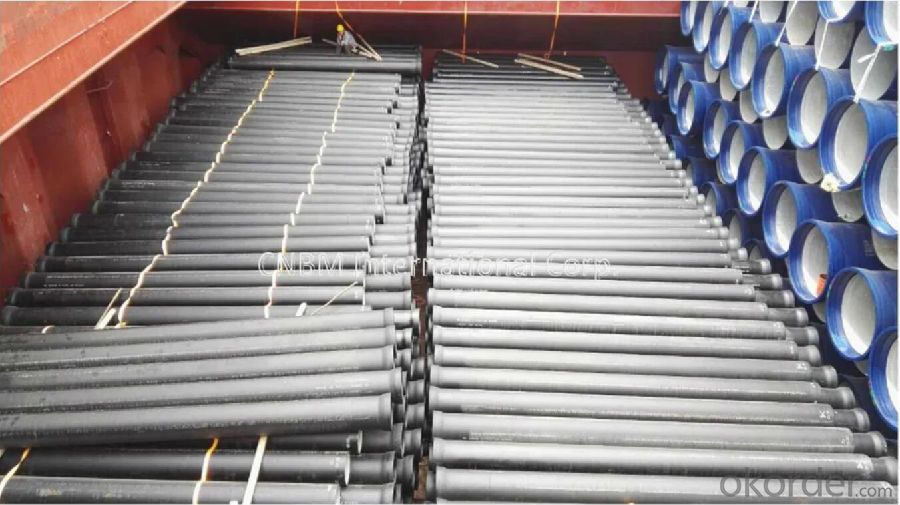
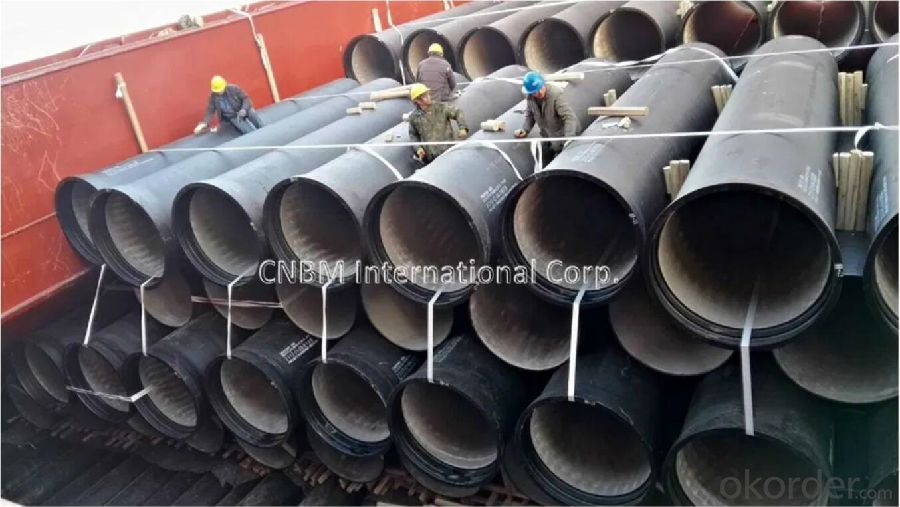
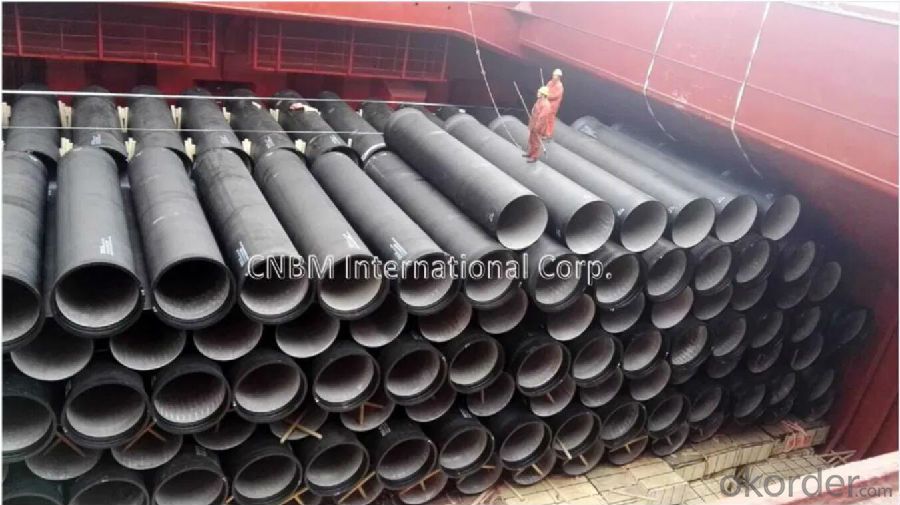
Some Projects


CNBM INTERNATIONAL CORPORATION
Build your world with our materials.
We are a primary subsidiary of China National Building Material Group Co., Ltd.
CNBM Group is a central government-owned enterprise and a Fortune Global 500 company (Ranking 203th in 2019). It is the largest building material manufacturer and service provider in the world, with 15 publicly-listed companies and over 180,000 employees (2017).
CNBM Water Section is one of the pioneering suppliers of pipes, fittings and systems in China.
We are leading the market by supplying:
Ductile iron water and sewer pipes, fittings, valves and couplings and adaptors
Ductile iron access covers and gratings
Other types of pipes and fittings
Why choose CNBM?
Government Credit
CNBM Intl is a primary subsidiary of CNBM Group, a Chinese central governmental enterprise. We've been accessed by D&B as Duns Registered 4A1 level since 2012, which endorsed us as one of the safest suppliers to work with in China.
Industry Leader
As an industry leader, CNBM Intl is also a top-ranking buyer of iron ore and coking coal in the world. Our raw materials' cost and quality are under strict control from A to Z.
Strong Logistics Capability
1. Professional Logistics team
2. 20,000 containers + 30,000 M3bulk vessel per year = Cost-effective and Prioritized Shipments
3. 50000 M2 Dubai Logistics Park solely-owned by CNBM
VIP services
1. Professional Sales Team
2. Multi-language Sales Managers
3. One-to-One fast response
One-Stop Purchase Solution
Over 800 kinds of industrial products within CNBM product range.
Our Services
Usually you can get our quotation within ONE day. In particular cases, we are committed to providing it within 48 hours.
Total technical supports from our senior consultant engineers.
Timely & Cost-efficient delivery.
Real time information of Chinese market.
Special discounts and protective policies provided to our distributors/partners.
FAQ
Are you a trading company or manufacturer?
CNBM is a large-scale central governmental industrial group with its own manufacturing sector, research and development sector, trading sector and logistics sector.
I have some special requirement about specifications.
We have a well-rounded product range, which endows us with the capability of applying many special specifications. Please feel free to contact us with yours.
Do you accept OEM service?
Yes, we do.
What is your delivery time?
It depends on the size/complexity of your order and our own production schedule. Usually we provide a faster delivery than the industry's average.
What is the payment term?
Our payment terms are negotiable.
Can I have my own logo on the product?
Sure, we can apply your own logo on the products according to your drawings.
Can I get samples?
Yes, you can. And you only need to bear the delivery costs, if the samples are not too big.
How is your company's experience?
We have an over 20 years of experience in water industry and been exporting to over 56 countries. We cherish our reputation as a company and our customers love us.
Can I request to change the form of packaging and transportation?
Sure, we're glad to fulfill your requirement. Yet please understand that extra costs may occur if the form of packaging and transportation are changed.
- Q: Can ductile iron pipes be used in geothermal systems?
- Yes, ductile iron pipes can be used in geothermal systems. Ductile iron is known for its strength and durability, making it suitable for various applications including geothermal systems. It can withstand high temperatures and pressures, making it an ideal choice for transporting hot fluids or steam in geothermal systems. Additionally, ductile iron pipes have excellent corrosion resistance, which is crucial in geothermal environments where the fluids can be chemically aggressive.
- Q: Ductile iron pipe in the direction of it?
- The utility model is mainly used for conveying water, and is an ideal choice for tap water pipes.
- Q: What's the difference between cast iron pipe and steel pipe?
- Cast iron pipes (Cast, Iron, Pipe), cast cast pipe. Cast iron pipes are used for water supply, drainage and gas transmission lines. They include cast iron pipes and pipe fittings. Labor intensity is small. According to the casting method, it is divided into continuous cast iron pipe and centrifugal cast iron pipe, in which the centrifugal cast iron pipe is divided into sand mould and metal type two kinds. Divided into gray cast iron pipe and nodular cast iron pipe according to different material. According to the interface form, it is divided into flexible interface, flange interface, self anchored interface, rigid interface and so on. Among them, the flexible iron pipes rubber sealing ring; flange interface cast iron pipe flange fixed in the rubber pad, the flange gasket sealing; rigid interface cast iron pipe socket is large, straight pipe is inserted, sealed with cement, this technology has been basically eliminated
- Q: Can ductile iron pipes be used for oil and gas pipelines?
- Ductile iron pipes can indeed be utilized for oil and gas pipelines. This robust and long-lasting material possesses corrosion resistance, rendering it ideal for the transportation of oil and gas across extensive distances. Moreover, ductile iron pipes display exceptional pressure-bearing capabilities, enabling them to endure the high pressures commonly associated with oil and gas transportation. Additionally, the installation and maintenance of ductile iron pipes are relatively straightforward, further enhancing their suitability for oil and gas pipelines. Nevertheless, it is crucial to acknowledge that the specific application and conditions of the pipeline necessitate careful consideration. Therefore, seeking advice from industry experts is strongly recommended to ensure the appropriate selection and installation of ductile iron pipes for oil and gas transportation.
- Q: What are the typical surge anticipation measures for ductile iron pipe?
- Typical surge anticipation measures for ductile iron pipe involve implementing various techniques to mitigate the potential damage caused by surges or water hammer in the pipe system. These measures are designed to absorb or redirect the sudden pressure changes, preventing the pipe from rupturing or failing. Some common surge anticipation measures for ductile iron pipe include: 1. Air chambers: Air chambers are installed at strategic points along the pipeline to provide a cushion of air that absorbs the energy generated by surges. As the pressure wave travels through the pipe, the air compresses, reducing the impact on the pipe and minimizing the risk of damage. 2. Surge tanks: Surge tanks are large vessels connected to the pipeline that act as storage reservoirs for excess pressure. When a surge occurs, the surge tank absorbs the excess water volume, preventing it from causing damage to the pipe. The stored water is then gradually released back into the system, allowing pressure to stabilize. 3. Surge relief valves: Surge relief valves are installed in the pipeline to automatically release excess pressure during surge events. These valves open when the pressure exceeds a preset limit, allowing the surge to dissipate harmlessly. Surge relief valves can be adjusted to release the desired amount of pressure, ensuring the safety of the ductile iron pipe. 4. Water hammer arrestors: Water hammer arrestors are devices that absorb the shock generated by surges and water hammer in the pipe system. They consist of a sealed chamber with a compressible gas or liquid that absorbs the sudden pressure changes. By absorbing the energy, water hammer arrestors protect the ductile iron pipe from potential damage. 5. Surge suppressors: Surge suppressors are devices that regulate the flow of water during surge events. They are designed to reduce the speed at which surges travel through the pipe, minimizing the impact on the system. Surge suppressors can be installed at critical points in the pipeline to prevent damage to the ductile iron pipe. It is essential to consider the specific requirements of the pipeline system and consult with experienced engineers or industry professionals to determine the most suitable surge anticipation measures for ductile iron pipe installations.
- Q: How does ductile iron pipe perform in areas with high soil erosion?
- Ductile iron pipe is known for its exceptional strength and durability, making it a reliable choice for areas with high soil erosion. Its unique composition, which includes graphite nodules, allows it to be both flexible and resistant to fractures or cracks, even in challenging environments. This makes ductile iron pipe highly capable of withstanding the impact of soil erosion. In areas with high soil erosion, the soil particles can scrape against the surface of the pipe, potentially causing abrasions or damage. However, ductile iron pipe's thick wall thickness and corrosion-resistant coating provide an effective barrier against these abrasive forces. This means that even in areas with significant soil erosion, ductile iron pipe can maintain its structural integrity and functionality. Moreover, ductile iron pipe's ability to resist corrosion further enhances its performance in areas with high soil erosion. Soil erosion often leads to an increased presence of moisture, which can accelerate the corrosion process of certain materials. However, ductile iron pipe's protective coating, typically made from zinc or epoxy, acts as a shield against corrosion, ensuring its long-term performance and reliability. In summary, ductile iron pipe demonstrates excellent performance in areas with high soil erosion due to its strength, flexibility, and resistance to fractures or cracks. Its thick wall thickness and corrosion-resistant coating make it highly durable against abrasive forces and corrosion, allowing it to withstand the challenges posed by soil erosion. As a result, ductile iron pipe is a dependable choice for infrastructure projects in such areas, providing long-lasting and efficient water and wastewater transportation systems.
- Q: How does ductile iron pipe handle soil movement?
- Ductile iron pipe is known for its excellent strength and durability, making it highly capable of handling soil movement. When the soil around the pipe shifts or settles, ductile iron pipes have the ability to flex and accommodate such movement without compromising their structural integrity. One of the key features that allows ductile iron pipes to handle soil movement is their inherent ability to withstand bending and stretching. They possess a high degree of flexibility, allowing them to adjust to ground shifts and settle without breaking or cracking. This flexibility is due to the unique material properties of ductile iron, which is a type of cast iron that has been treated with magnesium to enhance its strength and elasticity. Moreover, ductile iron pipes are designed with a thick-walled construction, which adds to their resistance against soil movement. This robust construction helps distribute the forces exerted by the shifting soil, minimizing the impact on the pipe and preventing any significant damage. In addition, ductile iron pipes are usually installed with appropriate bedding and backfill materials to provide additional support and stability. This includes using compacted soil or engineered granular materials around the pipe, which helps to evenly distribute the load and reduce the potential for soil movement. Overall, ductile iron pipe is an ideal choice for areas with high soil movement, such as regions with expansive or unstable soils. Its flexibility, strength, and proper installation techniques make it capable of handling the challenges posed by soil movement, ensuring long-lasting and reliable performance in various applications.
- Q: What is the expected bending stress capacity of ductile iron pipes?
- The expected bending stress capacity of ductile iron pipes varies depending on the specific grade and size of the pipe, as well as factors such as installation conditions and external loads. However, ductile iron pipes generally have high strength and flexibility, allowing them to withstand significant bending stresses. It is recommended to refer to the manufacturer's specifications and engineering guidelines for a more accurate estimation of the bending stress capacity of a particular ductile iron pipe.
- Q: What is the disadvantage of nodular cast iron in excess of silicon?
- Excessive silicon control results in the formation of nodular graphite in large cross section ductile iron and reduces the mechanical properties of castings.
- Q: Are ductile iron pipes suitable for underground installations?
- Yes, ductile iron pipes are suitable for underground installations. Ductile iron is a highly durable and strong material that can withstand the various pressures and stresses associated with underground environments. It has excellent resistance to corrosion, making it an ideal choice for underground applications where it may be exposed to moisture, soil, and other corrosive elements. Ductile iron pipes also have a high tensile strength, which allows them to withstand external loads and prevent cracking or breakage under ground movement or heavy traffic. Additionally, ductile iron pipes have a longer lifespan compared to other materials, making them a cost-effective option for underground installations. Overall, ductile iron pipes are a reliable and suitable choice for underground applications due to their durability, corrosion resistance, and long-term performance.
Send your message to us
ISO2531/En545/En598 Centrifugal Dcutile Iron Pipe
- Loading Port:
- Tianjin
- Payment Terms:
- TT or LC
- Min Order Qty:
- 1 m.t.
- Supply Capability:
- 500000 m.t./month
OKorder Service Pledge
OKorder Financial Service
Similar products
Hot products
Hot Searches
Related keywords
